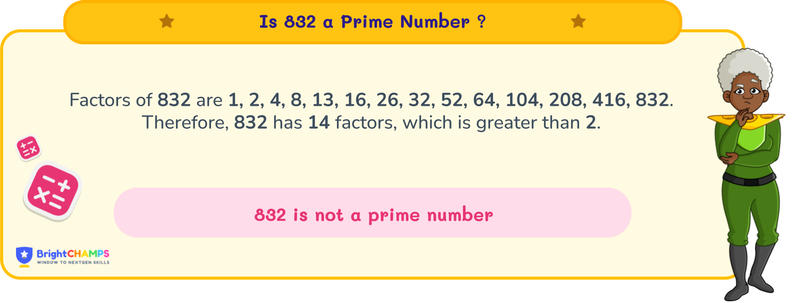Summarize this article:
 152 Learners
152 LearnersLast updated on August 5, 2025
Is 832 a Prime Number?

Prime numbers are numbers that have only two factors: 1 and themselves. They are essential in various fields such as encryption, computer algorithms, and barcode generation. In this topic, we will be discussing whether 832 is a prime number or not.

Is 832 a Prime Number?
Numbers can be categorized as prime or composite based on their factors.
A prime number is a natural number greater than 1 that is divisible only by 1 and itself.
For example, 3 is a prime number because it is divisible only by 1 and 3.
In contrast, a composite number has more than two factors.
For example, 6 is divisible by 1, 2, 3, and 6, making it a composite number.
Prime numbers have several properties, such as:
- Prime numbers are always greater than 1.
- 2 is the only even prime number.
- They have exactly two factors: 1 and the number itself.
- Any two distinct prime numbers are co-prime numbers because they have only one common factor, which is 1.
Since 832 has more than two factors, it is not a prime number.


Why is 832 Not a Prime Number?
A prime number has only two divisors: 1 and itself. Since 832 has more than two factors, it is not a prime number. Several methods can be used to differentiate between prime and composite numbers, such as:
- Counting Divisors Method
- Divisibility Test
- Prime Number Chart
- Prime Factorization

Using the Counting Divisors Method
The counting divisors method involves counting the number of divisors a number has to determine if it is prime or composite. Here’s how to check if 832 is prime or composite:
All numbers are divisible by 1 and themselves.
Divide 832 by 2. It is divisible by 2, so 2 is a factor of 832.
Continue checking divisibility by numbers such as 3, 4, 5, etc., up to the square root of 832.
Since 832 is divisible by numbers other than 1 and itself, it is a composite number.

Using the Divisibility Test Method
The divisibility test method involves checking if a number is divisible by other numbers without leaving a remainder. Here’s how it applies to 832:
Divisibility by 2: 832 is even, so it is divisible by 2.
Divisibility by 3: The sum of the digits in 832 is 13, which is not divisible by 3.
Divisibility by 5: The last digit is not 0 or 5, so 832 is not divisible by 5.
Divisibility by 7 and other primes can be checked similarly. Since 832 is divisible by numbers other than 1 and itself, it is a composite number.

Using Prime Number Chart
The prime number chart is created using the Sieve of Eratosthenes, which involves:
Listing numbers from 1 to 1000 in rows and columns.
Marking 2 as a prime number and crossing out all its multiples.
Repeating this for the next uncrossed number (3, then 5, etc.) until all numbers are marked or crossed.
Since 832 does not appear in the list of prime numbers, it is a composite number.

Using the Prime Factorization Method
Prime factorization involves breaking down a number into its prime factors and multiplying them to get the original number:
Start with 832 and divide by the smallest prime, 2: 832 ÷ 2 = 416.
Continue dividing by 2: 416 ÷ 2 = 208, 208 ÷ 2 = 104, 104 ÷ 2 = 52, 52 ÷ 2 = 26, and 26 ÷ 2 = 13.
13 is a prime number. Thus, the prime factorization of 832 is 2⁶ × 13.

Common Mistakes to Avoid When Determining if 832 is Not a Prime Number
Learners might have misconceptions about prime numbers. Here are some mistakes to avoid:

FAQ on is 832 a Prime Number?
1.Is 832 a perfect square?
2.What is the sum of the divisors of 832?
3.What are the factors of 832?
4.What are the closest prime numbers to 832?
5.What is the prime factorization of 832?
6.How can children in Saudi Arabia use numbers in everyday life to understand Is 832 a Prime Number??
7.What are some fun ways kids in Saudi Arabia can practice Is 832 a Prime Number? with numbers?
8.What role do numbers and Is 832 a Prime Number? play in helping children in Saudi Arabia develop problem-solving skills?
9.How can families in Saudi Arabia create number-rich environments to improve Is 832 a Prime Number? skills?

Important Glossaries for "Is 832 a Prime Number"
- Composite numbers: Natural numbers greater than 1 that are divisible by more than 2 numbers. For example, 832 is a composite number because it is divisible by numbers other than 1 and itself.
- Divisibility: The condition under which one number can be divided by another without leaving a remainder.
- Prime factorization: Breaking down a number into its prime factors. For example, the prime factorization of 832 is 2⁶ × 13.
- Prime numbers: Numbers greater than 1 that have exactly two factors: 1 and themselves.
- Sieve of Eratosthenes: An ancient algorithm used to find all prime numbers up to a specified integer.

Explore More numbers
![Important Math Links Icon]() Previous to Is 832 a Prime Number?
Previous to Is 832 a Prime Number?
![Important Math Links Icon]() Next to Is 832 a Prime Number?
Next to Is 832 a Prime Number?

About BrightChamps in Saudi Arabia


Hiralee Lalitkumar Makwana
About the Author
Hiralee Lalitkumar Makwana has almost two years of teaching experience. She is a number ninja as she loves numbers. Her interest in numbers can be seen in the way she cracks math puzzles and hidden patterns.
Fun Fact
: She loves to read number jokes and games.




